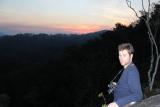
Robert Puschendorf was born and raised in Costa Rica. He studied Agriculture at EARTH University (Limón, Costa Rica) as an undergraduate, undertook a Masters in Zoology at the Escuela de Biología, Universidad de Costa Rica (UCR), to then undertake his PhD at James Cook University, Townsville Queensland. In 2010 he was awarded a Postdoctoral Research Fellowship from the Australian Research Council. Robert is currently a lecturer in Conservation Biology at the University of Plymouth, UK, and primarily conducts his field research on amphibian and reptiles, their pathogens and parasites within Área de Conservación Guanacaste (ACG) where he’s been working since 1999. In the past, his research interests have primarily focused the ecological and evolutionary consequences of the mass extirpations of amphibians in tropical areas, which are linked to emerging infectious disease and climate change.
More recently he has focused on the importance of environmental conditions in the frequency and likelihood of frog disease outbreaks, and the impacts on populations across different environmental gradients. Interestingly and significantly, this work has uncovered a pattern of dry forests as environmental refugia from disease driven amphibian extinctions, which is consistent across continents; in Costa Rica and tropical Australia.